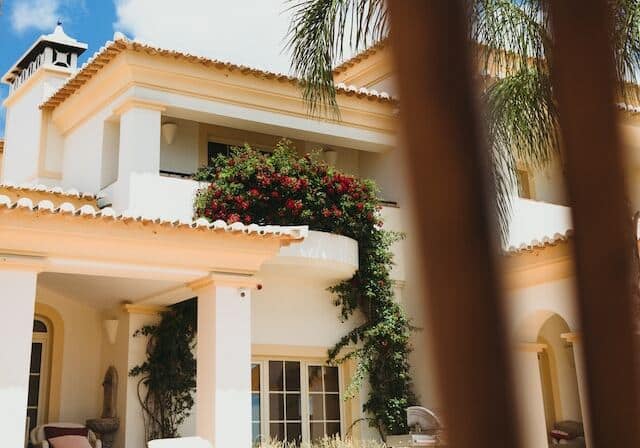Updated: July 9, 2025
Living in Lagos, Portugal means enjoying a relaxed lifestyle with beautiful beaches, stunning landscapes, crystal clear waters, and a timeless old-town charm.
Lagos has become one of Portugal’s most sought-after destinations for expats, perfect for those seeking to retire in style or work remotely. Located in the southern Algarve region of the country, nestled between Santa Maria and São Sebastião, the city has a rich history dating back to the 15th century.
Keep reading to discover what life in Lagos, Portugal, is really like, from the cost of living and attractions to how you can move or retire here.
The Lifestyle in Lagos
If you are considering living in Portugal as an expat, then Lagos is a top destination to consider.
Lagos, Portugal, is a popular choice for expats and retirees, offering a blend of natural beauty, history, and modern amenities. It’s a coastal town in the Algarve known for its stunning beaches, vibrant town center, and friendly atmosphere. Living in Lagos can be affordable, especially outside the city center, but it’s not the cheapest option in Portugal.
Below, we explore what your life in Lagos could look like
 Weather in Lagos
Weather in Lagos
Lagos has a Mediterranean climate with hot summers and mild winters. During the summer months, temperatures regularly reach 26 Degrees C (80 Degrees F).
Lagos’ winters are never too cold, with average high temperatures of 16 Degrees C (60 Degrees F) and lows of 10 Degrees C (50 Degrees F). You can also expect more rainfall during the winter months, although this is not too excessive.
 Language in Lagos
Language in Lagos
The official language of Lagos, Portugal, and the entire country is Portuguese, and it is spoken by the majority of the population. However, English is widely spoken in Lagos as it is a major language in the tourism industry.
Still, it’s always recommended to learn some Portuguese to make your integration into Portuguese life easier and to give you the best and most authentic experience of living as an expat in Lagos, Portugal.
 Healthcare in Lagos
Healthcare in Lagos
Portugal’s healthcare is considered one of the best in the world. It includes a public health service that is free or low-cost for citizens and legal residents. You’ll have access to a wide range of public medical services, such as general practitioner care, specialist practitioner care, hospitals, and prescription medication.
Private healthcare is also available and is considerably cheaper than in many other countries. Some expats choose private healthcare as it’s faster and more specific to their needs. Having valid health insurance is also a requirement when you apply for residency, so initially, private health care will be a good option.
 Schools in Lagos
Schools in Lagos
Expats with young children will be happy to know that Lagos is home to several schools, both public and private, that cater to the needs of different students and families.
Public schools follow the Portuguese curriculum and offer classes in Portuguese, English, and other languages.
Private and international schools, on the other hand, offer education in different languages such as English, French, and German. These schools typically follow the curriculum from the originating country. International schools in Lagos include Barlavento International Primary School, Vale Verde International School, and Nobel Algarve British International School.
Although not located directly in Lagos, higher education institutions are not far away either. These include the University of Algarve (about an hour away) and the Polytechnic Institute of the Algarve, which offer a range of undergraduate and graduate programs in various fields of study.
 Retiring in Lagos
Retiring in Lagos
Given the excellent weather, stunning beaches on your doorstep, excellent healthcare, and rich culture, it’s no mystery why Lagos is also popular with those who are looking to retire in the Algarve.
Retirees are able to enjoy a relaxed retirement close to the Atlantic Ocean, with all the conveniences to make a comfortable lifestyle. There’s a beautiful marina, quaint cafes and restaurants, easy access to transportation, tons of outdoor activities like golfing and watersports, and historic sights and attractions not too far away.
 Stunning beaches in Lagos
Stunning beaches in Lagos
Lagos is home to some of the most beautiful beaches in Portugal, such as Praia do Camilo, Praia Dona Ana, and Praia da Batata. Close by are also Meia Praia and a little further afield, Praia da Luz. These beaches offer crystal clear waters and golden sand, perfect for swimming, sunbathing, a boat tour, and water sports.
Meia Praia is the largest beach (4 km long) in the Lagos region. Many expats, digital nomads, and locals alike flock to this popular destination in the Algarve region.
 Getting around Lagos
Getting around Lagos
Getting around Lagos is easy, with many options available. The city is compact, so walking is popular among locals and expats. There’s also a bike-share program for exploring on two wheels.
For longer trips, Lagos has a well-connected and affordable bus system linking neighborhoods and beaches, as well as a train station with routes to other Algarve towns and cities. Taxis are easy to find, and car rentals are widely available.
Faro Airport is about an hour away, offering convenient international travel.
 Things to do in Lagos
Things to do in Lagos
Throughout the year, Lagos is host to many festivals which celebrate music, food, and culture. Some of the most popular festivals are the Lagos International Music Festival, the Lagos Carnival, and the Lagos Food Festival.
Historical Lagos is home to monuments and buildings, such as Lagos Castle and the Lagos Marina (Marina de Lagos), highlighting Lagos’ rich culture and history.
Lagos’ proximity to the sea means not only are you spoiled for choice with beaches, but there are also several marine and sea life centers where you can learn about the marine life in the Algarve, and you can see some of its wonderful sea life, such as dolphins, sharks, and rays.
Lagos also has a lively yet relaxed nightlife scene for when you feel like being out and about. Delicious, hearty food is also easy to find at any of the local restaurants.
Cost of Living in Lagos, Portugal
Southern Portugal, being a popular tourist destination, is more expensive than Portugal’s north. Nevertheless, in general, expenses and financial outgoings are lower in Portugal than in most other European countries. Most amenities, goods, and services are still reasonably priced compared to other countries.
Let’s break down the main living expenses to get a better idea of the cost of living in Lagos, Portugal.
Accommodation
Rental prices vary depending on the location and size of the apartment or property you require. A one-bedroom apartment in the center of Lagos costs, on average, between €1,050* per month and €1,000* outside the city center. Prices per square meter for buying real estate average €5,066.
Food
Food and groceries are a lot cheaper in Portugal than in other European countries, but your individual requirements and preferences will determine your weekly food bill.
The table below gives an overview of prices of basic food items:
Item | Price |
Milk (1 liter) | €0.92 |
Bread (500 g) | €2.13 |
Rice (1 kg) | €1.77 |
Eggs (12) | €2.70 |
Chicken (1 kg) | €6.67 |
Apples (1 kg) | €2.27 |
Water (1.5 liters) | €0.35 |
Eating out
Portugal is famous for its fresh and wholesome cuisine, such as fresh vegetables, fruit, and fish. If you enjoy eating in restaurants, you won’t have to pay a premium price for high-quality meals.
Depending on the restaurant, meals start from €10-12, with half a liter of beer costing €3.50 and a soft drink around €1.88. Alternatively, a three-course meal for two people at a mid-range restaurant will cost around €40.
Transportation
Both monthly passes and one-way tickets are available for local transport in Lagos. A one-way ticket costs around €1.50, and a monthly pass is €40.
Buying or Renting a House in Lagos as a Foreigner
Another advantage available to expats in Lagos, Portugal, is to invest in the thriving real estate market while living there. Because living in Lagos has become so sought after, it means buying property in Lagos is an excellent financial decision.
However, there is some merit in renting first, especially if you’re not quite sure about which is the best place to live in Lagos, Portugal, for your lifestyle and needs. Below, we weigh the pros and cons of each option.
 Renting a house in Lagos
Renting a house in Lagos
Lagos offers plenty of accommodation for rental, which may be an ideal way to find your feet in new territory.
Airbnb is a trusted way to find short-term lettings, but beware that prices may be higher during peak times, and your housing costs will be significantly higher than if you were to rent long term or buy a home.
Long-term rentals will give you a bit of financial relief compared to Airbnb accommodation, but you will still be vulnerable to rental price hikes as the area grows in demand. Because of this, if you’re planning to live in Lagos for a few years or more, buying a home makes more financial sense.
 Buying a house in Lagos
Buying a house in Lagos
Lagos is a desired area for property, not just because of its stunning location near the sea but also because of attractive real estate prices.
In 2024, the average asking price for houses for sale in Lagos, Portugal, was €5,388 per square meter. Note that this is the asking price, and the sales price is often considerably lower than this or, in less frequent cases, higher. Although Lagos is pricier than Portuguese cities close by, you’ll still be able to find all types of property without a premium price tag. A real estate agent in Lagos will be able to help you with the buy.
If you are considering buying property in Lagos, Portugal, you will find this part of the Algarve to be one of the standout locations, with properties that come with stunning ocean views, modern interiors, and a high quality of life guaranteed.
For additional information about the property market in Lagos, you can check out our Portugal Lagos Real Estate guide.
How to Move to Lagos
 Living in Lagos as an expat is no longer a pipedream, but with golden visas and a variety of residency permits available, it can be a real possibility for people of all ages, nationalities, and walks of life.
Living in Lagos as an expat is no longer a pipedream, but with golden visas and a variety of residency permits available, it can be a real possibility for people of all ages, nationalities, and walks of life.
The great news for citizens of the European Union (EU) is that moving to other EU countries, like Portugal, is quite easy. You can stay in any country in the EU as a tourist for three months. After that time, you will need a residence card to stay longer, which you can get from any local town hall with a valid ID document.
Non-EU and non-EEA citizens will need a visa to live in Portugal. Luckily, there is a wide range of visas to choose from, including:
- The Portugal Golden Visa program: This option requires an investment of at least €250,000. you can consult our Portugal Golden Visa: Your Ultimate Guide 2025
- The D7 Visa: This visa type is a great option for retirees. If you can prove that you earn at least €870 per month through passive income, such as a retirement fund, you can apply for this visa. Our comprehensive article and guide on Portugal’s Retirement Visa will give you more details about this option.
- The Digital Nomad Visa: This option enables remote workers to stay in Portugal as long as they have a monthly income of at least €3,480 per month. For more detailed information, read our ultimate guide on Portugal for Digital Nomads.
Our residency and citizenship division, Global Citizen Solutions is at hand with specialist advice and experience to help eligible applicants get their residency visas.
Living in Lagos: Pros and Cons
Now that we have a better idea of how to move to Lagos and what life could look like, let’s sum up its good sides and drawbacks to see if it could be the ideal place to live for you.
Pros of living in Lagos
- Relaxed lifestyle
- Lots of quieter towns nearby
- Reasonable property prices
- Cost of living in Lagos, Portugal, is affordable
- Great job opportunities
- Affordable and reliable public transport and infrastructure
- Close to Faro International Airport
- Excellent weather
- Plenty of things to do all year round
- Close to other Algarve hotspots
- Great place for digital nomads
- Located in a safe and peaceful country
- Beautiful beaches and nature
- Rich history and culture
- Welcoming expat community
- Good healthcare options and English-speaking services
Cons of living in Lagos
- Lots of tourist crowds during peak season
- The bureaucracy obtaining residency and a visa can be a little time-consuming
- Some businesses, especially those catering to tourists, may close during the off-season.
- Public transportation options may be limited
- Prices for accommodation and other services increase during peak tourist season
- Rural areas outside the city center may feel isolated
The Bottom Line on Living in Lagos Portugal
Living in the Lagos, Portugal, as an expat is a great option. With excellent transport links, a mild climate, the most stunning beaches, and attractive property prices, Lagos has a lot to offer, whether you’re relocating with family, retiring, or setting up as a digital nomad.
Here at Goldcrest, we can give you advice on real estate and help you find your dream home in Lagos. If you’re seriously considering the move, schedule a non-binding call with us, and we’ll help you discover the options available to you.
Frequently Asked Questions about Living in Lagos, Portugal
Is Lagos, Portugal, a nice place to live?
Lagos, Portugal, is an excellent place to live for people from all walks of life. Expats relocate with families, look to retire, or explore life as a digital nomad in this beautiful city.
Is Lagos, Portugal, expensive to live in?
Living in Southern Portugal is more expensive than living in the North or on Portugal’s Silver Coast. Nevertheless, the cost of living in Lagos, Portugal, and property prices are still more affordable than in other European cities.
How is it living in Lagos, Portugal?
Living in Lagos, Portugal, is perfect if you enjoy a vibrant and lively city full of history and culture. There is always something going on and lots of things to do.
The town is walkable, safe, and full of outdoor activities like surfing, hiking, and boating. It’s especially popular with retirees and expats looking for a slower pace of life. While it can get busy in summer, the rest of the year is quieter and more laid-back. The cost of living is affordable compared to much of Western Europe, and English is widely spoken, making it easy for newcomers to settle in.
Do they speak English in Lagos, Portugal?
Yes, English is widely spoken in Lagos, especially in tourist areas, restaurants, and among expats. While Portuguese is the official language, it is easy for visitors and new residents to get by with just English until they have time to pick up the basics of the Portuguese language.
Can you live in Portugal on $2,000 a month?
Yes, many people live comfortably in Portugal on $2,000 (about €1,770) a month, especially outside of the major cities like Lisbon and Porto. In Lagos, Portugal, for example, $2,000 can cover housing, groceries, transport, and leisure, though your lifestyle and housing choices will affect how far the budget stretches.